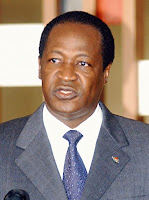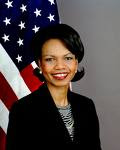For those naive souls among us who find idealistic revolutionaries to be romantic figures (at least, in concept, if not in practice), Burkina Faso offers an attractive tale: the story of Thomas Sankara and Blaise Compaoré. These two men are the "fathers" of modern Burkina Faso.
Sankara and Compaoré each began his career in the military of the former French colony, Upper Volta (as Burkina Faso was formerly known). Both men were part of the post-World War II generation of Africans that were newly liberated from European governance, and were, therefore, anti-Imperialist in their attitudes toward government. They met in 1976 when they helped form a secret organization within the Voltaic military, known as the Regroupement des officiers communistes, or Communist Officers' Group.
Although Sankara rose in the Voltaic political hierarchy (serving as Secretary of State for Information in the military government in September 1981), his career was marked by disaffection with the ruling administrations under Colonel Saye Zerbo, and later under Major-Doctor Jean-Baptiste Ouédraogo due to what he perceived to be their anti-labor policies. Sankara was immensely popular with the Burkinabé, maintaining something of a "common man" image. He rode his bicycle to his first cabinet meeting and played guitar in a band.
Compaoré's rise in the political hierarchy is less clear. He apparently became a kingmaker. He reportedly played a major role in the coup d'état that unseated Zerbo and installed Ouédraogo. But his profile was less visible than Sankara's, sort of a man-behind the throne. In August, 1983, dissatisfied with the Ouédraogo administration, he organized the coup that installed Sankara as president. He served as Minister of Justice during Sankara's presidency.
The Sankara presidency was one of monumental reform. Sankara renamed the country to Burkina Faso on the first anniversary of his installation as president. He abolished the tradition of chiefs' privileges in Burkina (wherein tribal leaders received tribute from subjects). He promoted women's rights by including many women in his government, banning female circumcision, discouraging polygamy and advocating contraception. He refused any comforts of office, going so far as to decline air-conditioning in his office, and selling the government fleet of Mercedes cars in favor of the cheaper Renaults. He also seemed to maintain his humility, saying at a press conference shortly after taking power:
But it was not all sunshine. Sankara estranged France because of his diplomatic and political ties to Libya's Muammar Gaddafi. His Comités de Défense de la Révolution, which he used to enforce his reforms sometimes came to resemble little more than armed thugs roaming the countryside."It's really a pity that there are observers who view political events like comic strips. There has to be a Zorro, there has to be a star. No, the problem of Upper Volta is more serious than that. It was a grave mistake to have looked for a man, a star, at all costs, to the point of creating one, that is, to the point of attributing the ownership of the event to captain Sankara, who must have been the brains, etc."--Thomas Sankara
Nonetheless, Burkina Faso seemed to have a hopeful future.
Then came October 15, 1987.
That was the day that Sankara was overthrown in a bloody coup d'état organized by none other than his old friend Blaise Compaoré. Fighting broke out in Ouagadougou and, in the end, Thomas Sankara and twelve other officials were dead.
Compaoré cited deteriorating relations with neighboring countries as his motive for the coup, and claimed that Sankara's death was an accident. Others disputed this, vociferously. On the surface, the facts promote suspicion. Was the coup really motivated by concern for Burkina Faso, or was it a power grab by Compaoré? And what about Sankara's death? Was it murder?
Compaoré's professional history seems to indicate that he has learned to advance via quick, unexpected strikes. On the other hand, I spoke with one Burkinabé who suggested that Compaoré merely beat Sankara to the punch, that Sankara was planning a strike against Compaoré, whom he viewed as a political rival.
That was the day that Sankara was overthrown in a bloody coup d'état organized by none other than his old friend Blaise Compaoré. Fighting broke out in Ouagadougou and, in the end, Thomas Sankara and twelve other officials were dead.
Compaoré cited deteriorating relations with neighboring countries as his motive for the coup, and claimed that Sankara's death was an accident. Others disputed this, vociferously. On the surface, the facts promote suspicion. Was the coup really motivated by concern for Burkina Faso, or was it a power grab by Compaoré? And what about Sankara's death? Was it murder?
Compaoré's professional history seems to indicate that he has learned to advance via quick, unexpected strikes. On the other hand, I spoke with one Burkinabé who suggested that Compaoré merely beat Sankara to the punch, that Sankara was planning a strike against Compaoré, whom he viewed as a political rival.
 |
| Project Ouagadougou 2000 |
Today, 20 years later, there are no conclusive answers. But Compaoré remains in power, having modified Burkina's constitution to allow him to continue to serve. Many of the reforms that Sankara initiated have been continued, particularly with regard to women's rights. Burkina has experienced economic progress; Ouagadougou is undergoing a modernization effort (promoted as "Ouagadougou 2000") that will transfer the city's center from the haphazard collection of streets and alleys near the airport to a new site with a planned European-style layout. Compaoré's visage is common in Ouagadougou, on tee shirts and billboards, and he is popular among his people.
The truth, if there is any definitive truth, is probably lost forever, even to those who witnessed events firsthand. The romantic figure of Thomas Sankara, man of the people, revolutionary, idealist, is now etched in history. His fall seems tragic and unnecessary. But as a friend of mine who served in the Peace Corps in west Africa said, "It's the African way."
The truth, if there is any definitive truth, is probably lost forever, even to those who witnessed events firsthand. The romantic figure of Thomas Sankara, man of the people, revolutionary, idealist, is now etched in history. His fall seems tragic and unnecessary. But as a friend of mine who served in the Peace Corps in west Africa said, "It's the African way."


















































